SWEDISH
SOUTH ASIAN STUDIES NETWORK
Newsletter 77:
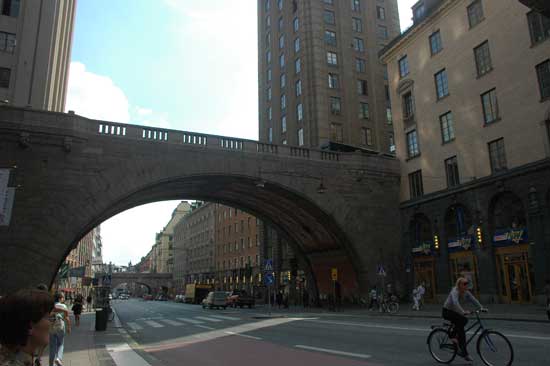 14 September 2007
14 September 2007
| Important lectures/seminars |
| Conferences and workshops |
| South Asia related Culture |
| New and updated information |
• SASNET supports conferences
The SASNET board met
in Lund on Tuesday 28 August 2007. Decisions were taken that SASNET should financially support the workshop on ”Post-Exotic
India – a new Narrative in Making?” to be held at Roskilde University in Denmark 26-27 September 2007 (more information), and to co-organise a major research conference titled ”Nature, Knowledge, Empire” in collaboration with Uppsala University Centre for Sustainable Development in August 2008. The board also decided that SASNET will become a member of the Sweden-India Business Council, and to set aside SEK 150 000 to fund the classification and marking for library use of the Karl Reinhold Haellquist books collection, donated to Lund University’s Asia Library a few years ago (more information about the books donation). Anna Lindberg and Lars Eklund presented their plan for a new contact journey, decided upon at the previous board meeting, to visit universities in India during November 2007. Finally the board approved the reference group’s decisions about planning grants taken earlier the same day.
• Planning grants to nine projects
 A total number of 20 applications had been delivered for consideration
in the 2007 round of SASNET grants. On Tuesday 28
August 2007 the SASNET Reference group (consisting of three
eminent Nordic South Asia scholars) decided to give networking/planning
grants to four research projects and one educational project. It also decided to give financial support
to two guest lecture programmes (for inviting a guest lecturer
from South Asia to visit more than one Swedish
university), and two South Asia related interdisciplinary research
workshops (to be held in Sweden or in South Asia). The total
amount distributed was 667 000 SEK. More
information.
A total number of 20 applications had been delivered for consideration
in the 2007 round of SASNET grants. On Tuesday 28
August 2007 the SASNET Reference group (consisting of three
eminent Nordic South Asia scholars) decided to give networking/planning
grants to four research projects and one educational project. It also decided to give financial support
to two guest lecture programmes (for inviting a guest lecturer
from South Asia to visit more than one Swedish
university), and two South Asia related interdisciplinary research
workshops (to be held in Sweden or in South Asia). The total
amount distributed was 667 000 SEK. More
information.
•
SASNET contact journey to India in November
During the period 1–30 November 2007, SASNET’s director Dr. Anna Lindberg and deputy director/webmaster Lars Eklund will make a new contact journey to South Asia. This time, they will mainly visit universities and research institutions in Northern and Western India. The ambition to promote researcher
cooperation and student exchange is the same as it was for the previous three contact journeys to different parts of South Asia that Staffan Lindberg and Lars Eklund successfully carried out in 2002, 2003 and 2005 (see the reports from the previous journeys). The places to visit will be Delhi, Thiruvananthapuram, Kottayam, Kozhikode, Mumbai, Loni, Pune, Bangalore and Mysore.
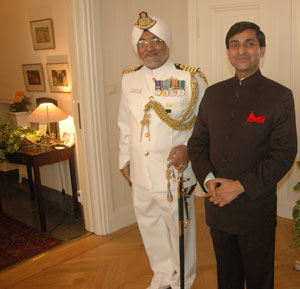 |
| The Defence Attaché, Captain (IN) J.S. Mann, and the First Secretary, Mr Rajesh Vaishnaw, welcome vistors at the Ambassador’s residence in Stockholm. |
• Stockholm visit on 15th August
On 15 August 2007, SASNET’s Director, Dr. Anna Lindberg, and Deputy Director, Mr. Lars Eklund, visited Stockholm in order to participate in the celebration of the 60th anniversary day of Indian independence, on invitation from the Indian Ambassador, Mrs. Deepa Gopalan Wadhwa. A large gathering of diplomats, university and business people, artists and journalists gathered at the the festive event in central Stockholm.
Later the same day, Anna and Lars visited the International Programme Office for Education and Training (Internationella Programkontoret) at Kungsholmen, and had a meeting with the administrator Eva Ehdwall. The International Programme Office for Education and Training is a Swedish government agency that comes under the Education and Culture Department. It administers some 60 different programmes and activities aimed at internationalising education, and is the authority in charge for two programmes of much interest for South Asian studies in Sweden, namely the Linnaeus Palme International Exchange Programme and the Minor Field Studies grants. They also administer another interesting form of grants, Sida’s travel grants for Swedish students who wish to do field work at an United Nations institution anywhere in the World, including South Asia.
From Kungsholmen, Anna and Lars went to make a short visit to the ongoing World Water Week conference, organised 12–18 August by the Stockholm International Water Institute (SIWI) in the Stockholm City Conference Centre. Hundreds of South Asian researchers participate in this major yearly conference, and we had a meeting with Dr Prakash Nelliyat, environmental economist from Madras School of Economics, Chennai, India, who has old links with SASNET. More information about Dr. Nelliyat.
• Priyankar Upadyaya holds SASNET lecture on Naxal Violence in India
Professor Priyankar Upadyaya, Director at the Malaviya Centre for Peace Research at Banaras Hindu University, Varanasi, India, will hold a SASNET lecture at Lund University on Tuesday 25 September 2007, 13.15–15.00, about ”Naxal Violence in India.
Security Threat or Failure of Governance?”. The lecture is organised in collaboration with Lund University’s Dept. of Economic History. Prof. Upadhyaya’s presentation unravels the dynamic of the maost/naxalite rebellion in India’s 'Red Corridor', stretching from Nepal to Andhra Pradesh, and whether its exclusive treatment as a security threat tends to obfuscate the generic issues of skewed democracy and development. Venue: Conference room, Centre for East and South-East Asian Studies (ACE), Scheelevägen 15 D, 1st floor. More information about Prof. Upadhyaya.
• SASNET seminar in Lund on Global Terrorism: Myth or Reality
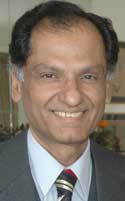 A seminar on ”Global Terrorism: Myth or Reality” will be held in Lund on Wednesday 10 October 2007, 19.30–21.15. The seminar is organised by SASNET in collaboration with the Centre for Middle Eastern Studies and the Association of Foreign Affairs at Lund University. The Ambassador of Pakistan to Sweden, H.E. Mr. Shaheen A. Gillani (photo to the left), will be the key speaker to talk about the theme for the evening. The other invited participants are:
Prof. Bo Huldt from the Swedish National Defence College in Stockholm, who will talk about ”Is Terrorism the Model for Warfare in the New Millennium?”,
Dr. Maria Bjernevi, former Senior Analyst at the Swedish Security Service (Säpo), who will talk about ”Global Jihad, Local Terrorism”, and
Iram Asif from the University of Copenhagen, who will talk about ”Behind the Screen: Young Women of Jamia
Hafsa”. Venue: Auditorium, SOL-Centrum (Lund University’s Centre for Languages and Literature), Helgonabacken 12/Finngatan 1, Lund. More information will follow.
A seminar on ”Global Terrorism: Myth or Reality” will be held in Lund on Wednesday 10 October 2007, 19.30–21.15. The seminar is organised by SASNET in collaboration with the Centre for Middle Eastern Studies and the Association of Foreign Affairs at Lund University. The Ambassador of Pakistan to Sweden, H.E. Mr. Shaheen A. Gillani (photo to the left), will be the key speaker to talk about the theme for the evening. The other invited participants are:
Prof. Bo Huldt from the Swedish National Defence College in Stockholm, who will talk about ”Is Terrorism the Model for Warfare in the New Millennium?”,
Dr. Maria Bjernevi, former Senior Analyst at the Swedish Security Service (Säpo), who will talk about ”Global Jihad, Local Terrorism”, and
Iram Asif from the University of Copenhagen, who will talk about ”Behind the Screen: Young Women of Jamia
Hafsa”. Venue: Auditorium, SOL-Centrum (Lund University’s Centre for Languages and Literature), Helgonabacken 12/Finngatan 1, Lund. More information will follow.
• Sunandan Roy Chowdhury holds SASNET lecture on Indian Educational Policy
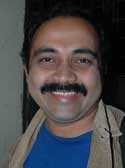 Mr. Sunandan Roy Chowdhury (photo to the right), Editor-Publisher of the Sampark Journal of Global Understanding in Kolkata, India, will give a SASNET lecture on ”Ideology of Nation State and Educational Policy”, focusing on Indian Higher education since 1947, at Lund University on Tuesday 23 October 2007, 15.15–17.00. Mr. Roy Chowdhury, who is also a researcher in didactics and participated as a key speaker at SASNET’s workshop on ”The Role of South Asia in
the Internationalisation of
Higher Education in Sweden” (held at Karolinska Institutet in Stockholm, November 2006, more information) critiques the skewed elitist development of higher education and shows how various policy options that could have created a more equitable and just society fell by the wayside as India rushed towards modernity.
Mr. Sunandan Roy Chowdhury (photo to the right), Editor-Publisher of the Sampark Journal of Global Understanding in Kolkata, India, will give a SASNET lecture on ”Ideology of Nation State and Educational Policy”, focusing on Indian Higher education since 1947, at Lund University on Tuesday 23 October 2007, 15.15–17.00. Mr. Roy Chowdhury, who is also a researcher in didactics and participated as a key speaker at SASNET’s workshop on ”The Role of South Asia in
the Internationalisation of
Higher Education in Sweden” (held at Karolinska Institutet in Stockholm, November 2006, more information) critiques the skewed elitist development of higher education and shows how various policy options that could have created a more equitable and just society fell by the wayside as India rushed towards modernity.
• More information about SASNET and its
activities
See SASNET’s page, http://www.sasnet.lu.se/sasnet.html
• South
Asia and the challenges of the 21st Century theme for Nordic Summer University programme
![]() ”South
Asia and the challenges of the 21st Century” will become
the theme for a new Nordic Summer
University (NSU) programme. A cluster of Nordic researchers
in South Asian studies, comprising Peter B Andersen, University
of Copenhagen; Hans Blomkvist, University of Uppsala; Michael W
Hansen, Copenhagen Business School; Sidsel Hansson and Catarina
Kinnvall, Lund University; and Pamela Price, University of Oslo,
had prepared the proposal which includes three winter sessions
(2008-2010) and smaller thematic workshops at the yearly NSU summer
sessions. The aim is to connect presently dispersed scholars on
South Asian studies and upgrade the existing mass of Nordic PhD
students and younger researchers ia the Nordic Summer University
activities. For more than 50 years NSU has been known to develop
academic and intellectual debates that has involved several leading
intellectuals, politicians, and scholars of the Nordic countries.
The organization is sponsored by the Nordic Council of Ministers.
The decision to accept ”South
Asia and the challenges of the 21st Century” (which is a
development of a joint Nordic research school on Asia
established in 2005 by NIAS in Copenhagen – more
information) was taken at the NSU annual conference in Uppsala in August 2007. More
information about the proposal.
”South
Asia and the challenges of the 21st Century” will become
the theme for a new Nordic Summer
University (NSU) programme. A cluster of Nordic researchers
in South Asian studies, comprising Peter B Andersen, University
of Copenhagen; Hans Blomkvist, University of Uppsala; Michael W
Hansen, Copenhagen Business School; Sidsel Hansson and Catarina
Kinnvall, Lund University; and Pamela Price, University of Oslo,
had prepared the proposal which includes three winter sessions
(2008-2010) and smaller thematic workshops at the yearly NSU summer
sessions. The aim is to connect presently dispersed scholars on
South Asian studies and upgrade the existing mass of Nordic PhD
students and younger researchers ia the Nordic Summer University
activities. For more than 50 years NSU has been known to develop
academic and intellectual debates that has involved several leading
intellectuals, politicians, and scholars of the Nordic countries.
The organization is sponsored by the Nordic Council of Ministers.
The decision to accept ”South
Asia and the challenges of the 21st Century” (which is a
development of a joint Nordic research school on Asia
established in 2005 by NIAS in Copenhagen – more
information) was taken at the NSU annual conference in Uppsala in August 2007. More
information about the proposal.
The first session of the new South Asia related NSU programme will be held during the coming winter, and focus on formulating a research proposal focusing on ‘Social Transformations, Political Capacities and Globalization’ in the South Asian context. The organisers will invite 10-12 senior researchers and PhD students to discuss the format and content of the proposal.
At the NSU session in the summer 2008 the proposal will be presented and the organisers then expect to commence the three year research period starting with a winter session 2008/09.
For more information about the initiative, please contact Peter B. Andersen for questions relating to the academic content (ph: +45 353 29190) and Martin Bech for practical questions (ph: +45 3532 9504).
• 40 panels accepted for the 20th ECMSAS conference in Manchester
 The
20th European Conference on Modern South Asian Studies (ECMSAS)
will be held in Manchester, UK, 8–11 July 2008.
The ECMSAS is the largest gathering of South Asia oriented researchers
in Europe, covering all fields from the humanities and social sciences
to technology, natural sciences and medicine. The conference is
held biannually under the aegis of the European Association of
South Asian Studies (EASAS), a professional, non-profit organisation
of scholars engaged in research and teaching concerning South Asia
with regard to all periods and fields of study.
The 2008 conference
will be hosted by the School of Arts, Histories and Cultures at
the University of Manchester, and draws on the vibrant South Asian
Studies programmes in Humanities and Social Sciences at the University. Go to the conference
web site.
The
20th European Conference on Modern South Asian Studies (ECMSAS)
will be held in Manchester, UK, 8–11 July 2008.
The ECMSAS is the largest gathering of South Asia oriented researchers
in Europe, covering all fields from the humanities and social sciences
to technology, natural sciences and medicine. The conference is
held biannually under the aegis of the European Association of
South Asian Studies (EASAS), a professional, non-profit organisation
of scholars engaged in research and teaching concerning South Asia
with regard to all periods and fields of study.
The 2008 conference
will be hosted by the School of Arts, Histories and Cultures at
the University of Manchester, and draws on the vibrant South Asian
Studies programmes in Humanities and Social Sciences at the University. Go to the conference
web site.
On 3 September 2007, the final list of conference panels was finalised. 40 panels were accepted, covering a vast field of scientific areas, from ”Censorship, Subjectivity, and Subversion: Cultural Regulation in India from the
Colonial Era to the Present” to ”Vegetarianisms: the communicative power of meat in South Asia” and ”Routes and Roots of Democracy in the Himalayas”. If you would like to present a paper at the conference, please submit an abstract to the convenor of the relevant panel and not to the organising committee. Full information about the accepted panels.
SASNET organised
the 18th ECMSAS conference in Lund in 2004 (more
information about the Lund conference), and in June 2006, the
19th ECMSAS conference was arranged in Leiden, the Netherlands
(read SASNET’s report
from the Leiden conference).
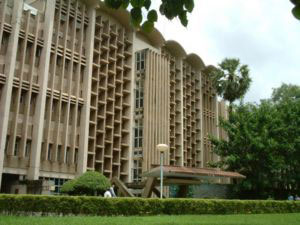 |
| IIT Mumbai tops Webomatric’s South Asian ranking list to be the best university in the Indian subcontinent. |
• IIT Mumbai, IISc Bangalore and IIT Kanpur top South Asian university ranking list
Webometrics Ranking of World Universities (WR) is an Internet based ranking produced by the Cybermetrics Lab, a unit of the National Research Council (CSIC), the main public research body in Spain. Its ranking is based on a combined indicator that takes into account both the volume of the Web contents and the visibility and impact of this web publications according to the number of external inlinks (sitations) they received. The ranking is updated every six months, providing Web indicators for universities and research centres worldwide. The Web indicators used are based and correlated with traditional scientometric and bibliometric indicators and the goal of the project is to convince academic and political communities of the importance of the web publication not only for dissemination of the academic knowledge but for measuring scientific activities, performance and impact too. The ranking system follows the Berlin Principles on Ranking of Higher Education Institutions (more information), set up by the International Ranking Expert Group (IREG) founded in 2004 by
the UNESCO European Centre for Higher Education (UNESCO-CEPES) in Bucharest and the
Institute for Higher Education Policy in Washington, DC. Besides the World Ranking of 4 000 universities worldwide (with Stanford, Massachusetts Institute of Technology and University of California Berkeley in top), Cybermetrics Lab also offers a Regional South Asian Ranking list with the 100 top universities in the subcontinent. The three universities in top of the list are the Indian Institutes of Technology (IIT) in Mumbai, the Indian Institute of Science (IISc) in Bangalore and the Indian Institutes of Technology (IIT) in Kanpur respectively. Go for the Regional Ranking list of Indian subcontinent universities (as a pdf-file).
• IISc in Bangalore tops Chinese ranking list to be best university in South Asia
Another Academic Ranking of World Universities is published every year by the Institute of Higher Education, Shanghai Jiao Tong University (IHE-SJTU) in China. Here the universities are ranked by several indicators of academic or research performance, including alumni and staff winning Nobel Prizes and Fields Medals, highly cited researchers, articles published in Nature and Science, articles indexed in major citation indices, and the per capita academic performance of an institution. This gives of course somewhat different results from the Webometrics ranking lists. Harvard, Cambridge, and Stanford top the World list. Regarding South Asia, the ARWU ranking shows that the top two South Asian universities are the Indian Institute of Science (IISc) in Bangalore, and the Indian Institute of Technology (IIT) in Kharagpur. They are the only ones to qualify for the Top 100 Asia Pacific Universities ranking list for 2007.
• Swedish university teachers protest against arrest of colleagues in Dhaka
In an open letter of protest to the Bangladeshi government (via its embassy in Stockholm), the Swedish Association of University Teachers (SULF) expresses its dismay against the arrest of two colleagues at Dhaka University. The two professors, Harun-or-Rashid, Dean of the Faculty of Social Sciences, and M. Anwar Hossain, Dean of the Faculty of Biological Sciences, have been arrested in connection with recent student unrest on the campus. In the letter, SULF argues that although the allegations have not been specified, it is legitimate that officials of the university defend the autonomy of their institution and protect the interests of their students in a free and liberal education. SULF also refers to the long-standing collaboration Swedish universities have with universities in Bangladesh, and the fact that many students on scholarships both from Bangladesh and from international sources come to Sweden. The organisation therefore urges the authorities to release the Dhaka University professors.
• More information about South Asia related
research at Swedish and Nordic universities
See SASNET’s page, http://www.sasnet.lu.se/research.html
Important lectures and seminars
• Equity in Rural Development theme for the 2007 Lund University Development Research Day
The 2007 Lund University Development Research Day
(Utvecklingsforskningens Dag) will be held on Monday 17 September
2007. The theme for the
day will be ”Equity in Rural Development”,
and the arrangement is jointly hosted by Lund University’s Dept.
of Economics and Dept.
of Economic History. The programme includes short lectures
in parallel sessions, by researchers and students presenting Minor
Field Studies, many of them related to South Asia. The main speakers are Dr. Francisco H. G. Ferreira from the World Bank, who will talk about ”Inequity and Development”;
Dr. Peter Hazell from IFPRI), who will talk about ”The Future of Small Farms for Poverty Reduction and Growth”; and Dr. Julie Litchfield from University of Sussex, who will talk about ”Poverty Dynamics and Agricultural Development”. More
information (in Swedish only).
• Bidyut Chakrabarty lectures in Copenhagen about economic liberalization in India
Professor Bidyut Chakrabarty, Dean of the Faculty of Social Sciences, University of Delhi, India, holds a lecture entitled ”Understanding Economic Reforms in India” in Copenhagen on Wednesday 19 September 2007, 10.00–12.00. The lecture is organised by the Asia Research Centre, Copenhagen Business School (CBS). Prof. Chakrabarty will discuss the economic liberalization in India, a double-edged device which while improving the lives of some Indian has also left millions more untouched. Hence it has been rightly pointed out that the essence of economic liberalization in India can be captured by a Buddhist proverb suggesting that ‘the key to the gate of heaven is also the key that could open the gate to hell’. Venue: Room K 143, CBS, Kilevej, Frederiksberg (at metro station Fasanvej), Denmark. More information.
• Seminar about India, China and the Geopolitics of Energy Security in Oslo
Professor C. Raja Mohan from the S. Rajaratnam School of International Studies, Nanyang Technological University, Singapore, will give a talk on ’India, China and the Geopolitics of Energy Security’ at the International Peace Research Institute in Oslo (PRIO) on Thursday 20 September, 12.00–13.30. Dr. Raja Mohan is one of the leading analysts of Indian foreign policy and international security affairs, and has served on India’s National Security Advisory Board. Please register with seminar@prio.no if you want to take part in this seminar. Venue: PRIO, Hausmanns gate 7, Oslo.
• Sida Development Area Forum on Climate Change in Stockholm
 The Swedish International Development Cooperation Agency, Sida, arranges a Sida Development Area Forum on Climate Change in Stockholm on Thursday 27 September 2007, 9.00–14.00. The theme for the 2007 Sida Development Area Forum will be ”Climate Change, Food Security and Poverty Reduction". Dipal Chandra Barua (photo to the right), deputy director for Grameen Bank, and director for Grameen Shakti, is one of the key speakers invited for the occasion. He will talk about how micro-credits can be combined with renewable energy resources like wind power, biogas energy, and solar energy, for hundreds of thousands of people in Bangladesh.
The Swedish International Development Cooperation Agency, Sida, arranges a Sida Development Area Forum on Climate Change in Stockholm on Thursday 27 September 2007, 9.00–14.00. The theme for the 2007 Sida Development Area Forum will be ”Climate Change, Food Security and Poverty Reduction". Dipal Chandra Barua (photo to the right), deputy director for Grameen Bank, and director for Grameen Shakti, is one of the key speakers invited for the occasion. He will talk about how micro-credits can be combined with renewable energy resources like wind power, biogas energy, and solar energy, for hundreds of thousands of people in Bangladesh.
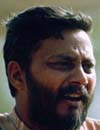 Another key speaker will be Rajendra Singh (photo to the left), founder of the organisation Tarun Bharat Sangh in the dry Indian state of Rajasthan. His organisation is one of the pioneers in field of decentralised community based water management systems in India. For more than 20 years it has mobilized local people in hundreds of villages in water-shed management projects, that has regenerated life and society in denuded and deserted lands. Venue: Sida, Valhallavägen 199, Stockholm. More information.
Another key speaker will be Rajendra Singh (photo to the left), founder of the organisation Tarun Bharat Sangh in the dry Indian state of Rajasthan. His organisation is one of the pioneers in field of decentralised community based water management systems in India. For more than 20 years it has mobilized local people in hundreds of villages in water-shed management projects, that has regenerated life and society in denuded and deserted lands. Venue: Sida, Valhallavägen 199, Stockholm. More information.
• One-day seminar about Copenhagen University's India related research
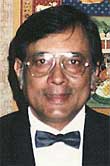 The Ambassador of India to Denmark, Mr. Partha Sarathy Ray (photo to the right), and the Indian Embassy in Denmark have donated a generous gift of books to the library at the Asian Department, Institute of Cross-Cultural and Regional Studies (ToRS), University of Copenhagen.
To celebrate the donation, the Institute organises a whole-day seminar about Copenhagen university’s India related research on Friday 28 September 2007, 10–15. Besides presentations by, for example, Dr. Kenneth Zysk on the Indology studies, Esther Fihl on the Danish Nationalmuseum’s Tranquebar project, and Jørgen Delman on the Nordic Institute of Asian Studies (NIAS), the latest initiative by the Institute of Cross-Cultural and Regional Studies – to introduce courses in Business relations – will be presented by its course administrator Charlott Hoffmann Jensen.
The Ambassador of India to Denmark, Mr. Partha Sarathy Ray (photo to the right), and the Indian Embassy in Denmark have donated a generous gift of books to the library at the Asian Department, Institute of Cross-Cultural and Regional Studies (ToRS), University of Copenhagen.
To celebrate the donation, the Institute organises a whole-day seminar about Copenhagen university’s India related research on Friday 28 September 2007, 10–15. Besides presentations by, for example, Dr. Kenneth Zysk on the Indology studies, Esther Fihl on the Danish Nationalmuseum’s Tranquebar project, and Jørgen Delman on the Nordic Institute of Asian Studies (NIAS), the latest initiative by the Institute of Cross-Cultural and Regional Studies – to introduce courses in Business relations – will be presented by its course administrator Charlott Hoffmann Jensen.
 These courses, called Kulturstudier.dk are concerned with the meeting between different cultures, religions and languages and being designed to cater for businesses or organisations that are establishing themselves abroad, hiring foreign employees or are facing cultural problems in connection with enterprises in the non-Western World. (More information about Kulturkurser.dk).
The seminar programme also includes a presentation of individual India related research projects by scholars at ToRS, and in the afternoon the official donation of the books will be carried out by the Indian Ambassador. If you plan to attend the program, registration should be made to Charlott Hoffmann Jensen. Venue: ToRS, room U3, Snorresgade 17-19, Copenhagen. More information, with full programme.
These courses, called Kulturstudier.dk are concerned with the meeting between different cultures, religions and languages and being designed to cater for businesses or organisations that are establishing themselves abroad, hiring foreign employees or are facing cultural problems in connection with enterprises in the non-Western World. (More information about Kulturkurser.dk).
The seminar programme also includes a presentation of individual India related research projects by scholars at ToRS, and in the afternoon the official donation of the books will be carried out by the Indian Ambassador. If you plan to attend the program, registration should be made to Charlott Hoffmann Jensen. Venue: ToRS, room U3, Snorresgade 17-19, Copenhagen. More information, with full programme.
• Seminar series with Sanjay Peters in Copenhagen about India, China and the Global Economy
 The Asia Research Centre at Copenhagen Business School invites for a seminar series 1–4 October 2007 on ”India, China and the Global Economy” with Prof. Sanjay Peters from the ESADE Business School in Barcelona, Spain. The seminar series, organised in collaboration with ChinaWorld, consists of four lectures. If you like to participate, please confirm your attendance no later than 21 September to Lisa Peitersen or Michael Jacobsen.
The Asia Research Centre at Copenhagen Business School invites for a seminar series 1–4 October 2007 on ”India, China and the Global Economy” with Prof. Sanjay Peters from the ESADE Business School in Barcelona, Spain. The seminar series, organised in collaboration with ChinaWorld, consists of four lectures. If you like to participate, please confirm your attendance no later than 21 September to Lisa Peitersen or Michael Jacobsen.
– On Monday 1 October, 10.00–12.00, Prof. Peters will talk about ”Economic Development, Political Reforms and Social Change in Contemporary India and China (1947-2007)”. Venue: Asia Research Centre, Porcelænshaven 24, 2000 Frederiksberg, Room 0.78.
– On Tuesday 2 October, 13.00–14.30, he will talk about ”Strategic Alliances versus Greenfield Investment: Accessing the Market and Managing Risks in China and India”, focusing on entrepreneurship and economic development in India and China, and the impact of state policy on individual business pursuits. Venue: Asia Research Centre, Porcelænshaven 24, 2000 Frederiksberg, Room 0.78.
– On Wednesday 3 October, 10.00-12.00, he will lecture about ”The Impact of India and China on Developed and Emerging Markets Respectively: Case Studies from the US, EU, Latin America and Africa”. Among other things, he will discuss the US economic growth vs. the rise of China and India, the impact of India and China on the economic growth and development in EU member states, and the issues whether Africa and Latin America will become winners or losers in the 21st Century due to the rise of China and India. Venue: Asia Research Centre, Porcelænshaven 24, 2000 Frederiksberg, Room 0.78.
– Finally, on Thursday 4 October, 16.00–18.00, he will lecture about ”Comparative Analysis of Investment Opportunities and Risks associated with India and China as Leading Emerging Markets”, discussing the business culture in China and India, and present an analysis of successful EU firms. Venue: Copenhagen Business School, Dalgas Have 15, 2000 Frederiksberg, Room SØ 089
• Crossing Disciplinary Boundaries in focus for SALT Thematic days in Uppsala
 The Forum for Advanced Studies in Arts, Languages and Theology
(SALT) at Uppsala University arranges its yearly event, SALT
Thematic days, on 4–5 October 2007. The theme for the 2007
event is ”Crossing Disciplinary Boundaries”,
and focus on the question of working across and between disciplines,
both from a theoretical perspective (What do we actually mean by
interdisciplinarity?) and a practical perspective (How can it best
be achieved?). Two renowned scholars, Prof. Paisley Livingston
and Prof. Sudipta Kaviraj, will initiate the discussions on 4 October
to be followed by a panel discussion
on 5 October. The thematic days will conclude with a panel of ‘decision-makers’ in
research funding to be challenged by young researchers and doctoral
students. Prof. Kaviraj,
professor of South Asian Politics in the Dept. of Middle
East and Asian Languages and Cultures at Columbia University in
New York, USA, will also hold one of the keynote lectures at the
2007 SALT Thematic days. More information
with full programme.
The Forum for Advanced Studies in Arts, Languages and Theology
(SALT) at Uppsala University arranges its yearly event, SALT
Thematic days, on 4–5 October 2007. The theme for the 2007
event is ”Crossing Disciplinary Boundaries”,
and focus on the question of working across and between disciplines,
both from a theoretical perspective (What do we actually mean by
interdisciplinarity?) and a practical perspective (How can it best
be achieved?). Two renowned scholars, Prof. Paisley Livingston
and Prof. Sudipta Kaviraj, will initiate the discussions on 4 October
to be followed by a panel discussion
on 5 October. The thematic days will conclude with a panel of ‘decision-makers’ in
research funding to be challenged by young researchers and doctoral
students. Prof. Kaviraj,
professor of South Asian Politics in the Dept. of Middle
East and Asian Languages and Cultures at Columbia University in
New York, USA, will also hold one of the keynote lectures at the
2007 SALT Thematic days. More information
with full programme.
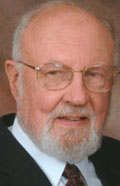 • Robert Eric Frykenberg lectures in Uppsala about Hindutva as a Political Religion
• Robert Eric Frykenberg lectures in Uppsala about Hindutva as a Political Religion
Professor Emeritus Robert Eric Frykenberg (photo) from University of Wisconsin, Madison, will lecture in Uppsala on ”Hindutva as a Political Religion”, on Tuesday 9 October 2007, 14.15–16.00. The lecture is part of
a seminar series organised by the Forum for Advanced Studies in Arts, Languages and Theology
(SALT) at Uppsala University in collaboration with the South Asia Seminar at the university. Venue: Room
1-0062, English Park Campus, Uppsala. More information about the South Asia Seminars at Uppsala University in the Fall 2007 (as a pdf-file).
• Copenhagen lecture by Frykenberg about Civil Violence in Tirunelveli in South India, 1859
Professor Emeritus Robert Eric Frykenberg from University of Wisconsin, Madison, will lecture in Copenhagen on Wednesday 17 October 2007, 11.00–13.00. He will talk about ”Roads, Riots, and Ritual Space: Civil Violence in Tirunelveli in South India, 1859”. The lecture is organised by the Institute for Cross Cultural and Regional Studies in collaboration with the Nordic Instute for Asian Studies, NIAS. Venue: Room: 036, 1st floor, Artillerivej 86, Copenhagen.
• Uppsala seminar to discuss Sudipta Kaviraj’s book ”An Outline of a Revisionist Theory of Modernity”
The South Asia Seminar at Uppsala University arranges a Literature Seminar, discussing Professor Sudipta Kaviraj’s book ”An Outline of a Revisionist Theory of Modernity” on Thursday 25 October 2007, 14.15–16.00. Prof. Kaviraj is based at the Dept. of Politics and International Studies at the School of Oriental and African Studies (SOAS), University of London, UK. Her book deals with Modernization, that according to Kaviraj does not follow a uniform path. The diversity of the historical experiences in the Third World countries imposes a severe revision of the theory. The case of India is taken as a good example. It helps the author to declare that there are two theorical lines which must be at the same time divided and connected. The first is functionalist, the second sequentiel, including contradictions and break thoughts. Venue: Room
1-1042, English Park Campus, Uppsala. More information about the South Asia Seminars at Uppsala University in the Fall 2007 (as a pdf-file).
• David Hardiman lectures in Uppsala on Agendas for Subaltern Studies
seminar with Prof. David Hardiman from Warwick University, UK, lectures at Uppsala University on Friday 9 November 2007, 14.15–16.00. Prof. Hardiman, who is historian and a founding member of the Subaltern Studies group, will talk about ”Agendas for Subaltern Studies: Trajectories for Writing Histories from Below”. Among his recent publications are "Histories of the Subordinated" (2006) and "Gandhi in his Time and Ours" (2003). The lecture is part of a seminar series organised by the South Asia Seminar at Uppsala University. Venue: Room 1-0062, English Park Campus, Uppsala. More information about Prof. Hardiman.
• Roskilde workshop on Post-Exotic
India – a new Narrative in Making?
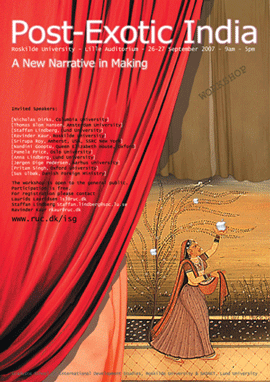 The
Graduate School of International Development Studies, Roskilde
University Centre (RUC) organises a two-days workshop titled ”Post-Exotic
India – a new Narrative in Making?” in collaboration
with SASNET on 26-27 September 2007 in Roskilde, Denmark. The seminar
is prepared by Dr. Ravinder Kaur and Prof. Laurids Lauridsen from
RUC and Prof. Staffan Lindberg, Lund University. The workshop aims
to posit and explore the post-exotic India through the following
themes:
• processes and effects of 1991 economic liberalisation, • emergence
of a vocal, mobile and astute middle class, • global ambitions
of India, and • its regional implications in South Asia. Invited
speakers include Nicholas Dirks, Columbia University, USA; Pritam
Singh, Oxford University, UK; Thomas Blom Hansen, Amsterdam University,
Netherlands; and Srirupa Roy, Amherst, USA, SSRC New York (TBC).
Venue: Roskilde Universiuty Centre, Lille Auditorium. More information with detailed programme (as a pdf-file)
The
Graduate School of International Development Studies, Roskilde
University Centre (RUC) organises a two-days workshop titled ”Post-Exotic
India – a new Narrative in Making?” in collaboration
with SASNET on 26-27 September 2007 in Roskilde, Denmark. The seminar
is prepared by Dr. Ravinder Kaur and Prof. Laurids Lauridsen from
RUC and Prof. Staffan Lindberg, Lund University. The workshop aims
to posit and explore the post-exotic India through the following
themes:
• processes and effects of 1991 economic liberalisation, • emergence
of a vocal, mobile and astute middle class, • global ambitions
of India, and • its regional implications in South Asia. Invited
speakers include Nicholas Dirks, Columbia University, USA; Pritam
Singh, Oxford University, UK; Thomas Blom Hansen, Amsterdam University,
Netherlands; and Srirupa Roy, Amherst, USA, SSRC New York (TBC).
Venue: Roskilde Universiuty Centre, Lille Auditorium. More information with detailed programme (as a pdf-file)
• Uppsala Research course on Christian Mission Archives
A Research course on ”Mission Archives and Approaches to the Study of the Christian Churches in India” will be held at Uppsala University 9–11 October 2007. The course, equivalent of 7.5 ECTS, is organised by Dr. Gunnel Cederlöf, Dept. of History,
Uppsala University; and Dr.
Peter B. Andersen, Dept. of Cross-Cultural
and Regional Studies,
University of Copenhagen, with financial support from Uppsala University and the Asian Century Research School Network (ACRSN), a Nordic research networking initiative. The key speaker will be Prof. Em. Robert Eric Frykenberg from University of Wisconsin, Madison. He will present papers about ”Mission and mission archive related research in India”, and "Hindutva as a political religion". Peter B. Andersen will talk about “TELC (Tamil Evangelical Lutheran Church) among Catholics,
Pentacostals and Hindus”. The participants will also be given a chance to visit the Church of Sweden archives, and other similar archives in Uppsala. Venue: English Park Campus. Centre for the Humanities, Thunbergsvägen 3, Uppsala. See the preliminary programme (as a pdf-file).
• Important preconferences to the 36th Annual Conference on South Asia in Madison
 The 36th Annual Conference on South Asia will be held 11–14
October 2007 in Madison, USA. It is sponsored by
the Center for South Asia at the University of Wisconsin-Madison.
The Annual Conference on South Asia attracts over 500 scholars
and other interested parties annually, featuring 75 or more academic
panels and roundtables, as well as association meetings and special
events ranging from performances to film screenings. The special focus of this year's conference is on contemporary India, its culture, politics and economy, on which the organisers have encouraged the submission of panel proposals. Venue: Madison
Concourse Hotel, 1 West Dayton St., Madison.
The 36th Annual Conference on South Asia will be held 11–14
October 2007 in Madison, USA. It is sponsored by
the Center for South Asia at the University of Wisconsin-Madison.
The Annual Conference on South Asia attracts over 500 scholars
and other interested parties annually, featuring 75 or more academic
panels and roundtables, as well as association meetings and special
events ranging from performances to film screenings. The special focus of this year's conference is on contemporary India, its culture, politics and economy, on which the organisers have encouraged the submission of panel proposals. Venue: Madison
Concourse Hotel, 1 West Dayton St., Madison.
Four preconferences will be held on Thursday 11 October 2007. These preconferences are: • The Second Annual Himalayan Policy Research Conference, organised by the Nepal Study Center; • Pakistan/Bangladesh/India: Building a Field of Scholarship and Dialogue on 1971; • South Asian Feminisms: Subjects, Audiences, Agendas; and • South Asian Legal Studies Workshop, organised by University of Wisconsin-Madison’s South Asian Legal Studies Working Group.
• 11th International Conference on Sri Lanka Studies to be held in Portsmouth
The 11th International Conference on Sri Lanka Studies (ICSLS) will be held on 1–3 November 2007 at the University of Portsmouth, UK. The Conference theme will be "Social Realities and Natural Environment, in Sri Lanka: Insiders' and Outsiders Perspectives". This theme is expected to focus on diverse perspectives on Sri Lankan social realities. The conference will also expand its coverage to discuss interface of social and natural environments within the framework of environmental sustainability. Final date for submission of abstracts has been extended till 1 October 2007.
• Ruth Manorama participates in seminars at Swedish Human Rights Forum in Stockholm
 The largest Nordic forum for Human Rights, MR-dagarna, will be held in Stockholm 19–20 November 2007. The theme for the 2007 Human Rights Forum, organised by Föreningen Ordfront, DemokratiAkademin, Fonden för mänskliga rättigheter, Teologiska högskolan i Stockholm och Utrikespolitiska institutet, will be ”War and Peace”. Among the large number of programmes, two focus on the problems for Dalit women in India. Ruth Manorama (photo) from the Indian National Federation of Dalit Women, and one of the recipients of the 2006 Right Livelihood Award (widely known as
the ”alternative Nobel Price”), will participate in a seminar on Monday 19 November, 10.00–10.45. The seminar is called ”Dalitkvinnor – de mest förtryckta” (Dalit women – the most opressed). The same day, a seminar entitled ”Försoning” (Reconciliation), will be held 16.45–18.15, with Ruth Manorama participating along with Aloysius Irudayam, Programme Director, Institute of Development, Education and Studies in Madurai, Tamil Nadu, India (more information). The seminar will be moderated by Hans Magnusson, Dalit Solidarity Network – Sweden. Venue: Stockholmsmässan, Mässvägen 1, Älvsjö. More information about the 2007 Human Rights Forum in Stockholm.
The largest Nordic forum for Human Rights, MR-dagarna, will be held in Stockholm 19–20 November 2007. The theme for the 2007 Human Rights Forum, organised by Föreningen Ordfront, DemokratiAkademin, Fonden för mänskliga rättigheter, Teologiska högskolan i Stockholm och Utrikespolitiska institutet, will be ”War and Peace”. Among the large number of programmes, two focus on the problems for Dalit women in India. Ruth Manorama (photo) from the Indian National Federation of Dalit Women, and one of the recipients of the 2006 Right Livelihood Award (widely known as
the ”alternative Nobel Price”), will participate in a seminar on Monday 19 November, 10.00–10.45. The seminar is called ”Dalitkvinnor – de mest förtryckta” (Dalit women – the most opressed). The same day, a seminar entitled ”Försoning” (Reconciliation), will be held 16.45–18.15, with Ruth Manorama participating along with Aloysius Irudayam, Programme Director, Institute of Development, Education and Studies in Madurai, Tamil Nadu, India (more information). The seminar will be moderated by Hans Magnusson, Dalit Solidarity Network – Sweden. Venue: Stockholmsmässan, Mässvägen 1, Älvsjö. More information about the 2007 Human Rights Forum in Stockholm.
• Third International Conference on Fermented Foods to be held in Anand
The Third International Conference on Fermented Foods will be held in Anand, Gujarat, India, 14–15 December 2007. It will be organised by the Dept. of Dairy Microbiology at Anand Agricultural University; in collaboration with the Dept. of Applied Nutrition and Food Chemistry, Lund University, Sweden, UNESCO Institute
of Trace Elements in Lyon, France; and the National Dairy Development Board in Anand, on behalf of the Swedish South Asian Network on Fermented Foods (SASNET–Fermented Foods), that was established with SASNET support in 2002. Last date for submissions of abstracts is 15 November 2007. More information (as a pdf-file)
• London conference on European Development Aid and NGOs
 An international conference on “European Development Aid and NGOs: Changing Notions of Civil Society in "North" and "South" will be held in London, UK, 12–14 March 2008. The conference is a joint cooperation between the London Scholl of Economics (LSE) Centre for Civil Society and the CINEFOGO Network of Excellence under the 6th EU Framework Programme. The aim is to investigate the changing approaches of European development aid towards European and Southern NGOs and the effects of these on the participation and well-being of poor and marginalised groups in developing countries. The conference reflects critically on the ways in which the concept of civil society is conceptualised in the `North’ and `South’, the strategies of support for civil society used by European donors, on the relationships between NGOs and other groups within civil society, and the changing power relations between European and Southern NGOs in the so-called North and South. Deadline for submission of abstracts: 15th September 2007. Venue: Goodenough College, London WC1. More information.
An international conference on “European Development Aid and NGOs: Changing Notions of Civil Society in "North" and "South" will be held in London, UK, 12–14 March 2008. The conference is a joint cooperation between the London Scholl of Economics (LSE) Centre for Civil Society and the CINEFOGO Network of Excellence under the 6th EU Framework Programme. The aim is to investigate the changing approaches of European development aid towards European and Southern NGOs and the effects of these on the participation and well-being of poor and marginalised groups in developing countries. The conference reflects critically on the ways in which the concept of civil society is conceptualised in the `North’ and `South’, the strategies of support for civil society used by European donors, on the relationships between NGOs and other groups within civil society, and the changing power relations between European and Southern NGOs in the so-called North and South. Deadline for submission of abstracts: 15th September 2007. Venue: Goodenough College, London WC1. More information.
• Panel abstracts wanted for the 22nd BASAS conference in Leicester
 The British Association for South Asian Studies (BASAS) holds its 22nd annual conference & AGM on 26–28 March 2008 at the University of Leicester, UK. Panel abstracts should be submitted before 30 November 2007. Each year, BASAS also awards a prize for the most outstanding paper given by a student at the annual conference. Both the paper and its presentation form part of the judging criteria. The paper may be on any subject relevant to the conference. More information about the 2008 BASAS conference.
The British Association for South Asian Studies (BASAS) holds its 22nd annual conference & AGM on 26–28 March 2008 at the University of Leicester, UK. Panel abstracts should be submitted before 30 November 2007. Each year, BASAS also awards a prize for the most outstanding paper given by a student at the annual conference. Both the paper and its presentation form part of the judging criteria. The paper may be on any subject relevant to the conference. More information about the 2008 BASAS conference.
• Amita Shastri guest speaker at 58th Annual Conference of the British Political Studies Association
The 58th Annual Conference of the British Political Studies Association will be hosted by the Department of Politics and International Relations at the Swansea University, UK, 1–3 April 2008. The conference is the largest UK gathering of researchers in politics and international relations. The Call for Papers is now available, closing date is 28 September 2007. In a Specialist Group Guest Speaker Competition, Professor Amita Shastri from San Francisco will participate. She will be hosted by the Development Politics specialist group (convenor: Ben Thirkell-White and Andrew Wyatt), the Ethnopolitics group (convenor: Stefan Wolff) and the Politics of South Asia Group (convenor: Lawrence Saez). Professor Shastri will give a paper on 'Political parties and the development of democracy in Sri Lanka' and will contribute to panels on contemporary politics in South Asia, prospects for the resolution of conflict in Sri Lanka, and the politics of ethnicity and development.
• Spaces of Dialogue theme for 22nd Pakistan Workshop at Rook How
The 22nd Pakistan workshop will take place at Rook How in the Lake District, Cumbria, UK, 9–11 May 2008. The theme chosen for the 2008 Workshop is ”Spaces of Dialogue” and it is hoped that papers will deal with various forms of dialogue among Pakistanis, between Pakistanis and other groups, and dialogue about Pakistanis, both in the past and in the present, at home and abroad, and the global and local contexts in which these dialogues take place. This workshop was founded to bring together anthropologists and sociologists whose research involved Pakistan, Pakistani diaspora and South Asian Islam. It is however open also to researchers from other disciplines. The number of participants is however kept low (normally only 25 or less people) so an early registration is highly recommended. More information.
• Philadelphia conference on Dalit Agendas: Emancipation,
Citizenship, and Empowerment
A conference titled ”Dalit Agendas: Emancipation,
Citizenship, and Empowerment” will be held in Philadelphia,
Pennsylvania, USA, 4–6 December 2008. It will be organised
by the Center for the Advanced
Study of India and the Department
of South Asia Studies at the University of Pennsylvania. The purpose
of the conference will be to evaluate strategies for ensuring that
Dalit agendas are recognized by and incorporated into mainstream
academic dialogue and to assess the various political and social
agendas, both contemporary and historical, that have sought to
improve the lives of Dalits.The
author of each paper proposal accepted for participation in the
conference will receive an honorarium of USD 500 that will
help to defray the costs of any additional research that will be
conducted for the paper. Travel (international or domestic,
as needed) to and from Philadelphia, meals, and accommodation will
be covered for all conference participants, and each contributor
whose paper is accepted for publication in the edited volume will
receive an additional honorarium of USD 500 following the final
submission of their paper. Deadline for paper proposals is 1
November 2007.
• Other conferences connected to South Asian
studies arranged all over the World
See SASNET’s page, http://www.sasnet.lu.se/conferences.html#conf
South Asia related culture in Scandinavia
• Bollywood in focus at Östasiatiska
Museet during the Fall 2007
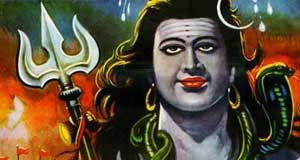 In
the autumn of 2007, the Museum of Far Eastern Antiquities (Östasiatiska
Museet) in Stockholm presents the exhibition "BOLLYWOOD
– Living gods of India". The exhibition takes
off in Indian films, and shows how contemporary India is connected
to its past through stories and myths about love, gods and heroes.
The gods belong to the everyday, but they are also worshiped in
great style at various festivities all year round. But India is
not only Hinduism. India is also the worlds third largest Muslim
country (after Indonesia and Pakistan). And many Christians, Jains,
Buddhists and Zoroastrians live here too. In the exhibition, the
museum’s own collections of sculptures and paintings meet
newer, borrowed and purchased material, for example from Helsinki
City Art Museum, including popular prints, painted altar figures
made of straw and clay, picture scrolls from Midnapur, printed
and hand-painted Bollywood posters, contemporary photographs and
a great many Bollywood films.
In
the autumn of 2007, the Museum of Far Eastern Antiquities (Östasiatiska
Museet) in Stockholm presents the exhibition "BOLLYWOOD
– Living gods of India". The exhibition takes
off in Indian films, and shows how contemporary India is connected
to its past through stories and myths about love, gods and heroes.
The gods belong to the everyday, but they are also worshiped in
great style at various festivities all year round. But India is
not only Hinduism. India is also the worlds third largest Muslim
country (after Indonesia and Pakistan). And many Christians, Jains,
Buddhists and Zoroastrians live here too. In the exhibition, the
museum’s own collections of sculptures and paintings meet
newer, borrowed and purchased material, for example from Helsinki
City Art Museum, including popular prints, painted altar figures
made of straw and clay, picture scrolls from Midnapur, printed
and hand-painted Bollywood posters, contemporary photographs and
a great many Bollywood films.
The exhibition will be inaugurated on Sunday 30 September 2007,
and last for six months. A catalogue, titled Masala Magazine, is
now being produced by the journalist Per J. Andersson, and this
will be sold in connection with the exhibition. Venue: Museum of
Far Eastern Antiquities, Skeppsholmen, Stockholm. More
information
• Sarod player from Kolkata performs at Södra Teatern
The Indian Sarod player Avijit Ghosh from Kolkata will perform at Södra Teatern in Stockholm on Tuesday 9 October 2007, 20.00. He will be accompanied by the Tabla player Bivash Sanghai, and perform clasical Indian ragas. The concert is organised in collaboration with the Embassy of India, the Indian Council for Cultural Exchange, and the Museum of
Far Eastern Antiquities. Venue: Mosebacke Torg 1-3, Stockholm. More information.
• Qawwali concerts with Pakistani singer Asif Ali Khan
A few days earlier, the Pakistani Qawwali singer Asif Ali Khan also performs with his large group of musicians at Södra Teatern in Stockholm.
Asif Ali Khan regularly tours the World, and in 2002 he participated on Bruce Springsteen’s cd ”The Rising”. The concerts are on Friday 5 October 2007, at 22.00, and on Saturday 6 October, at 20.00. Venue: Mosebacke Torg 1-3, Stockholm. More information.
• Bollywood film festival at Filmhuset in Stockholm
The Sweden India Film Association (SIFA) organises an Indian Film Festival in Stockholm, 8–12 October 2007. The festival is held at Filmhuset, Borgvägen 1 (Gärdet), and Dev Anand will be the chief guest. Among the films to be shown are ”Gandhi my father” directed by Feroz Abbas Khan, ”Dor” directed by Nagesh Kukunoor; and ”Hare Rama Hare Krishna” directed by Dev Anand. More information.
• Classic Bollywood movies to be shown in Stockholm
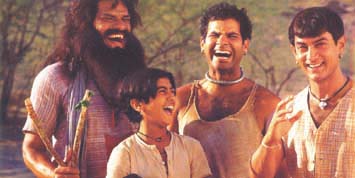 Cinemateket also runs a Bollywood film festival in Stockholm during the period 11– 27 oktober 2007. The festival is run in collaboration with the Embassy of India and the Museum of
Far Eastern Antiquities (whose Bollywood exhibition is inaugurated just before). The films to be shown are
Raj Kapoor’s ”Raj – tjuven i Bombay” (Awaara) on Thursday 11 Oct.; Aparna Sen’s ”Mr. and Mrs. Iyer” on Friday 19 Oct.; K. Asif’s ”Mughal-e-Azam” on Sunday 21 Oct.; and Ashutosh Cowariker’s ”Lagaan: Once Upon a Time in India” on Saturday 27 Oct.. Venue: Filmhuset, Borgvägen 1 (Gärdet), Stockholm. More information.
Cinemateket also runs a Bollywood film festival in Stockholm during the period 11– 27 oktober 2007. The festival is run in collaboration with the Embassy of India and the Museum of
Far Eastern Antiquities (whose Bollywood exhibition is inaugurated just before). The films to be shown are
Raj Kapoor’s ”Raj – tjuven i Bombay” (Awaara) on Thursday 11 Oct.; Aparna Sen’s ”Mr. and Mrs. Iyer” on Friday 19 Oct.; K. Asif’s ”Mughal-e-Azam” on Sunday 21 Oct.; and Ashutosh Cowariker’s ”Lagaan: Once Upon a Time in India” on Saturday 27 Oct.. Venue: Filmhuset, Borgvägen 1 (Gärdet), Stockholm. More information.
• Contemporary South
Asian non-fiction films shown at Kathmandu film festival
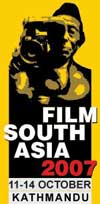 For
the sixth time, the Film South Asia festival will be held in
Kathmandu, Nepal, 11–14 October 2007. This competitive
biennial festival of South Asian non-fiction films highlights
various issues that concern the region – be
it social, political, economic, cultural, or lifestyle related.
The festival provides a platform for exhibiting new works and promoting
a sense of community among filmmakers. Started in 1997, FSA is
the only event solely dedicated to showcasing contemporary South
Asian non-fiction films. Documentaries made in and after January
2005 are eligible for the competitive section. More
information.
For
the sixth time, the Film South Asia festival will be held in
Kathmandu, Nepal, 11–14 October 2007. This competitive
biennial festival of South Asian non-fiction films highlights
various issues that concern the region – be
it social, political, economic, cultural, or lifestyle related.
The festival provides a platform for exhibiting new works and promoting
a sense of community among filmmakers. Started in 1997, FSA is
the only event solely dedicated to showcasing contemporary South
Asian non-fiction films. Documentaries made in and after January
2005 are eligible for the competitive section. More
information.
• Information about South Asia related culture
in Scandinavia
See SASNET’s page, http://www.sasnet.lu.se/culture.html
New and updated items on SASNET web site
• Swedish departments where research on
South Asia is going on:
Constantly added to the list of research environments at Swedish
universities, presented by SASNET. The full list now includes 214 departments,
with detailed descriptions of the South Asia related research and education
taking place! Go to http://www.sasnet.lu.se/environment.html
• Useful travelling information
Look at http://www.sasnet.lu.se/travelling.html.
Updated travel advises from the The British Foreign & Commonwealth
Office about safety aspects on travelling to the countries of
South Asia.
Best regards,
Anna Lindberg Lars Eklund
SASNET/ Swedish South Asian Studies Network
SASNET is a national network
for research, education, and information about South Asia, based at Lund
University. The aim is to encourage and promote an open and dynamic networking
process, in which Swedish researchers co-operate with researchers in South
Asia and globally.
The network is open to all sciences. Priority is given to co-operation
between disciplines and across faculties, as well as institutions in the
Nordic countries and in South Asia. The basic idea is that South Asian
studies will be most fruitfully pursued in co-operation between researchers,
working in different institutions with a solid base in their mother disciplines.
The network is financed by Sida (Swedish
International Development Cooperation Agency) and by Lund
University.
Postal address: SASNET – Swedish South Asian Studies Network,
Scheelevägen 15 D, SE-223 70 Lund, Sweden
Visiting address: Ideon Research Park, House Alpha 1 (first floor,
room no. 2040 & 2041), in the premises of the Centre for East and South
East Asian Studies at Lund University (ACE).
Phones: + 46 46 222 73 40 and +46 46 222 36 06
Fax: + 46 46 222 30 41
E-mail: sasnet@sasnet.lu.se
Web site:
http://www.sasnet.lu.se
Staff: Anna
Lindberg, director/coordinator & Lars
Eklund, webmaster/deputy director
SASNET - Swedish South Asian Studies Network/Lund
University
Address: Scheelevägen 15 D, SE-223 70 Lund, Sweden
Phone: +46 46 222 73 40
Webmaster: Lars Eklund
Last updated
2010-02-24